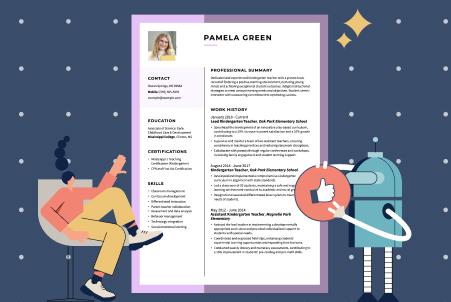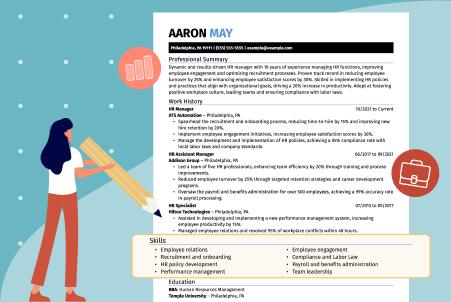Our customers have been hired at: *Foot Note
Table of Contents
Get started with MyPerfectResume today!
- Build a resume on any device
- Pick an ATS-friendly template
- Tailor with AI copy suggestions
Job interviews can be stressful, even for an experienced HR administrative assistant. How you tackle each answer shows an employer what type of candidate you are.
We can help you create a strategy to make the most out of your HR administrative assistant interview questions to showcase your skills, experience and achievements.
Explore our sample HR administrative assistant interview questions and answers and browse pro tips to get started. Use our Resume Builder to perfect your job application and win more interviews.
Make a resume with MyPerfectResume
Our Resume builder can help you write the perfect resume. Start Now!
Common HR administrative assistant interview questions
These common questions are generally used to start your HR administrative assistant interview. The employer wants to learn more a bit your background and experience.
Remember to tailor your responses by incorporating skills and experiences that align with the responsibilities of the role.
Tell me about yourself.
Often used as an “ice breaker" into your work style and organizational fit, this question offers the interviewer an insight into your professional background, skills, accomplishments and experience.
You can help set the tone of the interview by providing an answer that aligns with the role.
Here are some tips on how to approach this question:
- Structure your information: Start with the present (your current role, skills and experience), then highlight the past by emphasizing your previous work and how it relates to the job you’re interested in, and finish with the future by showcasing how your background can contribute to the role.
- Emphasize your skills and expertise: Focus on the specific skills learned through your experience that make you a strong fit for the HR administrative assistant position. Highlight your proficiency in areas such as HR administration, employee relations, payroll management and compliance.
- Show your achievements: Interviewers want to learn about any accomplishments or projects you have completed that demonstrate your skills and expertise. Remember to add metrics that can help them understand how you have contributed to the success of previous organizations and how you can add value to their team.
- Highlight your personality: Feature your personality but keep it professional! Use techniques such as storytelling or share relevant professional stories or anecdotes. Focus on traits and qualities that relate to the job you're applying for.
- Showcase your enthusiasm and commitment: Convey your genuine passion for HR administration and your eagerness to contribute to the organization's success.
- Keep it short: Provide a brief, concise answer that highlights your professional experience and qualifications. Just like an elevator pitch technique, you should aim to keep your response to no more than 1-2 minutes, as going on too long can make you appear unfocused or unprepared.
Example Answer:
"As a detail-oriented HR administrative assistant with a passion for organization and efficiency, I am confident that I have the right combination of skills and experience to excel in this role. Throughout the course of my career, I delivered top-notch administrative support to an office with 150 staff members, promoting excellence in operations and improving productivity by 25%.
Additionally, I managed scheduling, developed and updated spreadsheets and databases and responded to phone calls, emails and other correspondence daily to facilitate communication and enhance business processes."
You can include a personal anecdote to help you connect with the employer, like this second example:
Example Answer:
"As a child, I developed a passion for organization and order through meticulously arranging my toys and books. Later, while participating in school clubs like the Student Government Association, Human Resources and Event Planning, I realized my professional path was in the administrative industry.
I pursued a career in HR administrative assistance to leverage my organizational skills and enhance HR processes. With experience in managing records, coordinating recruitment, and implementing digital systems that improved productivity by 35%, I am confident in my ability to excel in this role and contribute to your organization's success."
Why do you want to work as an HR administrative assistant?
Hiring managers are looking for candidates who have a clear understanding of the role’s responsibilities and duties, as well as a genuine interest in the position.
It’s essential to highlight your skills, work history and passion for the role. See our library of resume examples for additional guidance on showcasing your skills and qualifications.
They are looking for someone who can effectively communicate their abilities and experience and their desire to contribute to the organization's success.
When answering this question:
- Express your interest in the company and role.
- Present your relevant skills.
- Talk about your passion for organization.
- Highlight your desire to contribute to this new role.
- End by expressing your excitement.
Example Answer:
“I am interested in working as an HR administrative assistant because I have a strong passion for organization, attention to detail and effective communication skills. With my background in managing records, coordinating recruitment and implementing digital systems, I can excel in this role and contribute to the organization's success. I've been following your work for a while and I'm excited about the opportunity to work in a dynamic environment that values teamwork, collaboration and personal growth.”
What are your key strengths and weaknesses?
When asking about your strengths, the interviewer wants to understand what unique skills you bring to the table and how they match the requirements of the job.
For weaknesses, the interviewer wants to understand your self-awareness and your ability to identify areas for improvement.
Focus on your strengths first by:
- Highlighting the top areas that make you a strong candidate.
- Showcasing your transferable skills and how you can apply them to the desired role.
- Providing specific examples and achievements including metrics to support your strengths.
Example Answer:
“My key strengths are my ability to communicate effectively, both verbally and in writing. I am also highly organized, and I'm able to manage multiple tasks simultaneously while ensuring that each one is completed to a high standard. In addition, I am a creative thinker, and I enjoy finding innovative solutions to complex problems. For example, in my previous role, I was able to streamline several processes, which resulted in a 20% increase in productivity for my team.”
For weaknesses:
- Choose one or two areas for improvement that are not critical to the job.
- Explain how you are working to overcome them through personal development or seeking feedback.
- Always end on a positive note by emphasizing your commitment to self-improvement and growth potential.
Example Answer:
“One area that I have identified as a weakness is public speaking. While I am comfortable presenting information to small groups, I tend to get nervous when speaking in front of larger audiences. However, I have been actively working on overcoming this weakness by participating in public speaking workshops and volunteering as a speaker at several conferences. I have already seen improvements in my confidence and delivery, and I am committed to continuing to develop this skill.”
Use our ATS Resume Checker to scan your resume for 30+ common errors and receive optimization suggestions to improve your resume score.
Technical HR administrative assistant interview questions
To effectively answer technical HR administrative assistant interview questions, showcase your knowledge and proficiency with pertinent HR software, regulations and systems.
Use keywords and offer concrete examples of how you have utilized these resources to simplify procedures, ensure adherence to regulations and uphold precise employee records.
Additionally, highlight your ability to handle sensitive HR issues, manage benefits enrollment and leave requests, and use HR metrics for decision making.
Convey your commitment to staying up to date on industry trends and implementing best practices to drive organizational success.
Describe your experience with HR software.
As a point of contact in the organization, your HR software proficiency and technical skills are one of the most important abilities you can highlight in your interview.
To answer:
- Showcase the specific tools and systems you have worked with in your previous roles.
- Emphasize your ability to adapt to new software and learn new systems quickly.
- Provide examples of how you have utilized these software programs to streamline HR processes, improve data accuracy and enhance employee experience.
Example Answer:
"In my previous role as an HR coordinator assistant, I used ADP to process payroll and manage employee benefits enrollment. I also worked with Workday to maintain employee records, track time off requests, and generate HR reports for senior management. Additionally, I have experience using HRIS systems to manage employee onboarding and offboarding procedures."
How do you handle payroll processing?
Payroll is a fundamental aspect of employee compensation and must be handled accurately and on time to ensure employee satisfaction and trust.
This process involves sensitive employee information, such as social security numbers and bank account details, which must be kept confidential and secure.
When asked how you handle payroll processing:
- Start by mentioning your familiarity with payroll software and systems.
- Discuss your ability to accurately calculate wages, deductions and taxes, ensuring compliance with relevant laws and regulations.
- Highlight your experience in verifying and reconciling payroll data, addressing any discrepancies, and providing timely and accurate pay to employees.
Example Answer:
"In my previous role, I streamlined the payroll process by implementing Papaya Global, a new software system. This automated many manual tasks, reducing processing time by 20%, minimizing errors and allowing us to operate at a bigger scale. I also established a clear communication protocol with employees, ensuring they received timely and accurate information about their paychecks."
Explain the process of employee onboarding.
With this question, an employer wants to know how much you truly understand about the process. To answer, go beyond presenting each step and highlight your role in all or one of the sections.
Example Answer:
"At my previous role, we followed the five main steps into onboarding. I was the contact person helping the new hires.
This was my role for each step:
During Onboarding, I coordinated with relevant departments to set up the new employee's workspace, provide the necessary equipment and ensure that all paperwork is in order.
For Orientation and Introduction, I presented the new employee to the company's mission, values, culture, policies and procedures. Also, provide a tour of the office and introduce them to their team members and colleagues. I wanted to make them feel comfortable in this new environment!
For Training and Development, I introduced the new employee to the necessary training and resources to perform their job effectively. This included materials and points of contact to complete any training.
I scheduled the Performance Management meeting, where higher ups explained the expectations, goals and objectives for the new employee.
And finally, for Integration and Engagement, I encouraged the new hire to integrate into the company's culture and foster a sense of belonging and engagement. I would reach out to them every so often to include them social activities, buddy programs and mentoring."
Other commonly asked technical questions include:
- What HR software or systems have you worked with in your previous roles? Can you describe your experience with them?
- How do you ensure compliance with local, state and federal HR regulations? Can you give an example of how you have dealt with a compliance issue in the past?
- Can you walk me through the process of onboarding a new employee? How do you ensure that all necessary paperwork is completed accurately and on time?
- Can you explain the benefits of the enrollment process? How do you ensure that employees understand their options and make informed decisions?
- Can you describe your experience with HR metrics and reporting? How do you use data to inform HR decisions and measure the success of HR programs?
Explore our guide on how to write a resume for expert tips on crafting a resume that showcases your unique skills and qualifications.
Behavioral HR administrative assistant interview questions
Behavioral interview questions help employers understand how you've handled tasks and issues in your previous roles.
Beyond your skills and performance, the employer learns if you are a fit for the company and have the experience or potential they're seeking.
How do you manage conflict in the workplace?
Conflict resolution is one of the most sought-after soft skills in human resources.
This interview question examines your aptitude for effective communication and active listening, as well as your ability to comprehend the underlying problems and perspectives of all parties involved.
It entails fostering a safe and respectful atmosphere that encourages individuals to freely express their concerns.
Provide examples showing your ability to:
- Actively listen to all parties involved.
- Identify the root of the conflict.
- Find a common ground.
- Present potential solutions.
- Encourage communication and collaboration.
- Set clear expectations and boundaries.
- Involve a mediator or escalate to a higher authority, if needed.
- Address the conflict in a respectful manner.
Use the STAR method to create a clear answer. The STAR method is simple and helps you track your storytelling by providing a clear-cut structure.
Example Answer:
"At ABC Company, I resolved a conflict between two departments vying for the same conference room. It as creating a tense environment for the entire office. I facilitated meeting, where we identified the need for a fair and predictable booking system. I proposed a rotating schedule and implemented a centralized online booking system, resolving the conflict, fostering collaboration and enhancing efficiency."
Give an example of a time you improved an HR process.
Remember to keep your response concise and focused on the most important details of your experience.
To answer:
- Begin by outlining the problem and the HR process you enhanced
- Highlight the specific steps you took to bring about improvement.
- Mention any innovative ideas or collaborative efforts you engaged in to achieve your objective.
- Conclude by discussing the positive outcomes resulting from your efforts, including metrics and any proactive measures you implemented to prevent the issue from recurring.
Example Answer:
“In a previous role, I noticed that the onboarding process for new employees was cumbersome and time-consuming. To address this, I proposed and implemented an online onboarding portal that streamlined the process and allowed new hires to complete necessary paperwork electronically. As a result, the onboarding time was significantly reduced, leading to an increased efficiency of 25% and a more positive experience for new employees.”
How do you prioritize tasks during busy periods?
When presented with this question:
- Focus your response on your ability to prioritize tasks based on urgency and importance.
- Include how you manage your time efficiently.
- Explain how you make effective decisions to ensure productivity even in busy periods.
Your answer will also show your ability to communicate and collaborate with others to ensure tasks are completed successfully.
Example Answer:
"During busy periods, I prioritize tasks by considering urgency, importance, time estimates, potential interruptions and opportunities for delegation or collaboration. When appropriate, I delegate tasks or collaborate with colleagues to optimize efficiency and leverage expertise. I would regularly review my task list and adjust priorities as needed to ensure alignment with evolving circumstances and goals. This approach enables me to tackle the most critical tasks first, maintain efficiency and deliver high-quality work even during busy periods."
Time to update your resume? Use a professional resume template to take the guesswork out of formatting your document.
Situational HR administrative assistant interview questions
Situational questions are designed to evaluate how you would handle scenarios or challenges that may arise in the job.
This helps interviewers assess your critical thinking, problem-solving skills and ability to apply your knowledge and experience to real-world situations.
What would you do if an employee violated company policy?
This question focuses on your ability to handle sensitive situations and ensure that you are familiar with the company's policies and procedures.
Your answer will highlight your expertise, communication and conflict resolution skills.
To address this question, it's important to:
- Clarify the nature and severity of the policy violation.
- Explain you would follow the company's established protocol for handling policy violations.
- Emphasize the importance of maintaining confidentiality and treating the employee with respect throughout the process.
- Highlight any disciplinary actions recommended.
- Emphasize proactive steps to prevent future policy violations by communicating expectations clearly and providing training and support to employees.
Example Answer:
"First, I would confirm the employee is in fact violating company policy through a thorough internal investigation and begin documenting the process. Once it is established that a violation did occur, and it is not a fireable offense, I'd recommend initiating the protocol matching the violation. Throughout the entire process, I would maintain the privacy of all parties involved and rely on the recommendations of higher-ups."
How would you handle a dispute between two employees?
Provide an example that shows:
- How you acknowledge the conflict promptly and professionally.
- Your step-by-step approach to handling the dispute.
- How you facilitated an open, respectful communication where each each person expressed their concerns and viewpoints.
- How you helped find common ground or areas of compromise.
- Emphasize the importance of confidentiality and ensuring that all parties involved feel heard and respected throughout the process.
- Examples of how you would monitor the situation closely to ensure the resolution is effective and follow up with the employees to ensure any lingering issues are addressed.
Example Answer:
"At my previous role, I navigated a delicate situation where employee A accused employee B of taking credit for their idea. Both individuals held significant roles, making the situation potentially disruptive. I investigated the issue further through interviews with both parties, the people present at the meetings and their colleagues. Then, we facilitated a meeting where I acted as mediator.
We listened to both sides and reached a resolution. It was revealed that employee A originated the core idea, while employee B contributed valuable refinements. It was decided that both employees would receive clear recognition for their respective contributions. Furthermore, we established a simple written documentation protocol to credit innovative ideas, safeguarding intellectual property and preventing similar conflicts."
Describe a situation where you had to implement a new HR policy.
Hiring managers are looking to assess your ability to create and implement policies that align with the company's goals and values. They want to know how you approach change management, how you communicate changes to employees, and how you measure the policy’s effectiveness.
To answer:
- Choose an HR policy where you play an important role.
- If you haven't had the chance to implement a policy, let the employer know and present an HR policy idea you've had in mind.
- Use the PAR method to answer. PAR stands for Problem, Action, Result. This will help you keep track of your answer by introducing the problem, presenting the action taken to solve it and show the resolution solving the issue.
- Highlight the steps you took to implement the policy.
- Emphasize the impact this HR policy had throughout your workplace.
- Be concise and clear by avoiding rambling and unnecessary details
Example Answer:
"In my free time, I volunteer at a local shelter. Through the community we serve, I learned about instances where abusive partners would show up at their workplaces.
While we haven't had this issue at our company, I wanted to prevent it from happening through proactive measure. This led me to establish the Domestic Violence Policy, which outlines a clear procedure that starts as soon as an employee reports any domestic violent incident.
This procedure creates a dated paper trail, offers resources and support to all employees, and provides dedicated protection to any domestic violence survivors. To establish the protocol, I secured the help of a pro bono expert from the shelter. While we still haven't had any incidents, employees have expressed their gratitude and have informed themselves and their colleagues about the policy and its resources."
Get a custom HR administrative assistant resume and cover letter
Our Resume Builder and Cover Letter Generator make it easy to craft a winning job application in a matter of minutes.
Use the samples below to build your HR administrative assistant resume and cover letter and secure more interviews.
Impress hiring managers by showcasing relevant HR skills in your job application materials and your interview answers.
Tips for answering HR administrative assistant interview questions
Research the company
This is an essential step in preparing for a job interview, and is one of the foundations for your interview success. To effectively research the employer:
Visit the company website: Start by visiting the company website to learn more about their products or services, mission, values and culture. Look for information about their history, leadership team and recent news or press releases.
Check social media: An active social media account can give you insights into their brand and culture, as well as any recent events or initiatives they are involved in.
Use search engines: Conduct a Google search to find any information about the company that might not be available on their website or social media accounts. Look for news articles, reviews and any other information that might be relevant to your research.
Look at company reviews: Check online reviews from current and former employees. to gain insights into the company's culture, work-life balance and overall employee satisfaction.
Research the industry: Research the industry the company operates in to understand trends, challenges and opportunities. This can help you understand the company's position within the industry and how it compares to its competitors.
Practice your answers
Practicing your answers before an interview ensures clarity and conciseness in your message and reduces nervousness and anxiety.
Plus, rehearsing your answers enables you to identify the most pertinent topics and learn how to highlight them in your responses.
Practice helps you manage your time effectively during the interview, adapt to different interview styles and highlight your strengths and relevant experiences.
Find a trusted individual to provide feedback on your answers and body language. Working on your answers can significantly increase your chances of success in the interview process.
Highlight relevant experience and skills
Employers want to see how well your skills align with the job requirements and how you can bring value to the company.
They also want to assess your ability to communicate effectively, articulate strengths, and tie your work experience back to the needs of the company.
With the job description as a guide, use keywords and prioritize your experiences and skills that align with the job requirements.
Provide specific examples with quantifiable results of how your experiences and skills have prepared you for the role.
Key takeaways
- Understanding what each HR administrative assistant interview question seeks can help you provide better answers.
- Prepare and practice the most commonly asked interview questions to approach your interview day confidently.
- Always answer each question with the role and employer in mind. Adapt each answer to show what you're bringing to the table.
- Using techniques like the STAR method helps you build a structured answer and keep mental note of where your answer is headed.
- Emphasize your technical, administrative and other HR skills throughout every single answer.
- Quantifiable achievements highlight your skills and relevant experience. Incorporate them into in your answers.
- Always maintain a professional stance, but let your personality shine through.
Our customers have been hired at:*Foot Note








